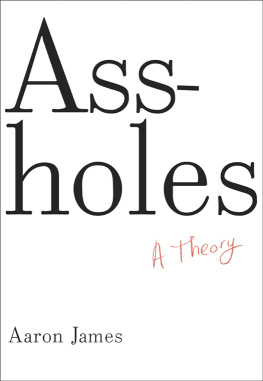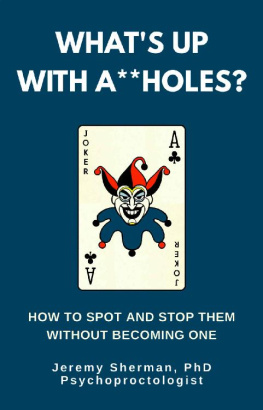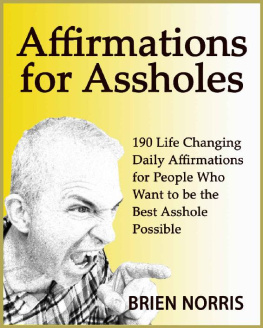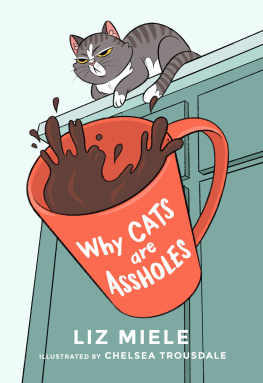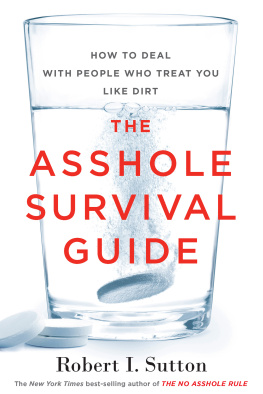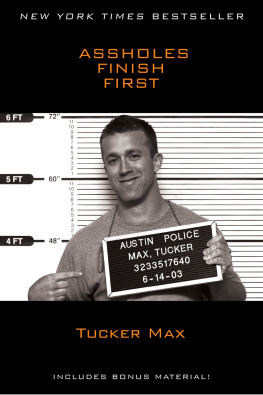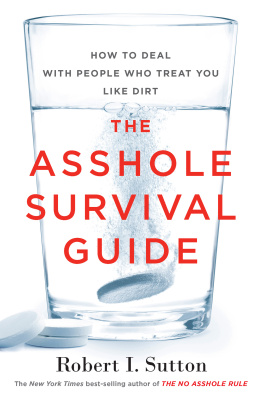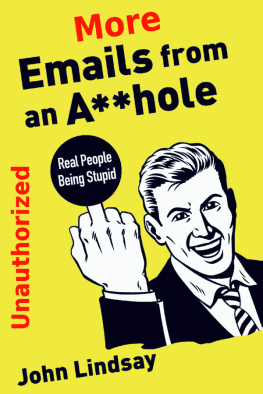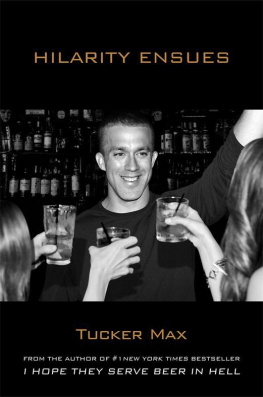ACKNOWLEDGMENTS
This book is inspired by surfers, especially the asshole surfers who reliably appear, with remarkable similarity (albeit with regional stylistic differences), at the main surf breaks around the world. Although our global tribe is hardly special (academia, my other tribe, also has plenty of assholes), I owe a special debt of gratitude to my fellow surfer tribesmen who have proven, over many years, to be a rich source of both irritation and intellectual stimulation.
My basic definition of the asshole was originally formulated at the beach, with the help of four friends from the University of Manchester Surf Club, during their summer visit from England in 2008: Danielle Bjelic, Rich Claughton, Tim Quick, and Lucy Thompson. The theory was further enriched by numerous interdisciplinary conversations over lunch during my fellowship year, 200910, at the Center for Advanced Study in the Behavioral Sciences (CASBS), Stanford University. A first short version of the theory was drafted at the center on a brief break from my normal research on fairness in the global economy, which became a book entitled Fairness in Practice: A Social Contract for a Global Economy (New York: Oxford University Press, 2012). The initial short draft was considerably revised with the wise guidance and support of Donald Lamm. Without Don, the book would not have happened; the ideas would have remained a way of blowing off steam. I am also grateful to Melissa Chinchillo, who, with Don, guided the project, placing it in the hands of Gerry Howard, by all accounts (and especially mine) the very best editor this project could have had.
The book is the product of many minds and many enjoyable conversations. For regular exchanges and encouragement, I especially thank Taylor Blodgett, Marshall Cohen, Margaret Gilbert, Sunny Karnani, and David Tannenbaum, with special thanks to Fiona Hill and Nicholas Jolley for discussion of public and historical figures, and to Cristiana Sogno for suggesting a Horatian version of the Letter to an Asshole. I am indebted to John-Paul Carvalho and Jennifer Herrera for help with the game theory appendix, and to the UC Irvine graduate students in our asshole discussion group at the Anteater Tavern, which included Andreas Christiansen, Michael Duncan, Matthew Dworkin, Justin Harvey, Violet McKeon, Daniel Pilchman, Valentina Ricci, Justin Thomsen, and Amanda Trefethen. For their insights, I also thank Secil Artan; Graeme Bird and Kerstin Maas; Xavier Cornillie; John Dent; Joseph Dowd; Ed Feuer; Luca Ferrero; Steve Finlay; Mark Fiocco; Al Franklin; Samuel Freeman; Julia Fremon; Brad Frohling; Nathan Fulton; Mike Granieri; Sean Greenberg; Phil Goodrich; Liz Harman; Nicole Hassoun; Matt Hayden; Jeffrey Helmreich, Pamela Hieronymi; Kristin Huerth; Nadeem Hussain; Linda Jack, Alex, Alin, Elizabeth, and Wendy James; Thijis Janssen; Mark Johnson; Melissa Johnson; A. J. Julius; Ken Keen; Erin Kelly; Bonnie Kent; Louise Kleszyk; Rahul Kumar; Doug Lavin; Brian Leiter; Alissa Maitino; Daniel McClure; Dan Oberto; Alexi Patsaouras; Casey Perin; Cynthia Pilch; Jesse and Elaine Pike; David Plunkett; Mike Powe; Ankita Raturi; Andy Reath; Holly Richardson; Vanessa Rollier; Jacob Ross; Chris Sanita; Debra Satz; Lucy Scanlon; T. M. Scanlon; Ricky Schaffer; Tamar Schapiro; Martin Schwab; Bob Scott; Brian Skyrms; Kelly Slater; David W. Smith; Larry Solum; Lucho Soto; Eric Schwitzgebel; Dan Speak; David Sussman; Julie Tannenbaum; Paul Tannenbaum; Peter and Sally Tannenbaum; R. Jay Wallace; Leif Wenar; Stephen White; Douglas Woodward; Gideon Yaffe; the 200910 fellows at CASBS; and the audience at a CASBS continuing-studies lecture at Stanford University. I apologize to anyone I forgot to mention; the book is still better because we talked. Finally, I am grateful to Peets coffee at the University Center in Irvine, California, where much of the book was drafted during the fall of 2011.
I share the reluctance about pop philosophy widely felt among professional philosophers, and it has been uncomfortable to relax (some might say abandon) the usual professional standards of rigor and decorum in favor of much tomfoolery. The risk of transgression, of doing bad work, and of forgoing important projects, even if temporarily, has seemed tolerable only given my hopes of offering a different kind of contribution: a book that shares all the fun conversations Ive been having; that gives succor to those afflicted by an asshole; that offers a glimpse into philosophy through a basic human concern; and that draws together standard philosophical themes in a new way. I thank the many people who encouraged me in this. I also thank those who urged caution, for caring enough to say something.
Also by Aaron James
Fairness in Practice: A Social Contract
for a Global Economy
APPENDIX
A Game Theory Model of Asshole Capitalism
Our story of asshole capitalisms decline in is inspired by the formal theory of games. I therefore consulted Oxford-trained UC Irvine game theorist Jean-Paul Carvalho on how this distinctive process of decline might be modeled. Over a fruitful lunchtime discussion, Carvalho thought up and proved (with simple, mainly illustrative math) a possible model that captures central features of the way asshole capitalism undoes itself. This appendix describes the model for the general reader while providing some background explanation of game theory. (It was written with the generous help of talented UC Irvine logic and philosophy of science graduate student Jennifer Herrera.)
The theory of games studies how different agents would strategically interact, given the choices of other agents. Each player in the game is said to have preferences for how things go, which he or she acts on, depending on what other agents are choosing. The theorist considers what patterns of action emerge when such players interact, in a single round of play or in repeated interactions.
In the stag hunt game inspired by Rousseau, for example, each playeryou and Ican either hunt stag or hunt hare. If we both hunt stag, we both eat more bounteously than if we each separately hunted hare. So we both prefer to hunt stag. However, both of us must join the huntwe both must cooperatein order for either of us to reap this greater benefit. But neither us can know whether the other will in fact show up for the hunt. If you show up and I dont, you miss out on a chance of hunting hare, or indeed of hunting at all, and wind up with nothing.
What should you do? Take a risk on the greater benefit of bounteous eating? Or play it safe and simply hunt hare on your own from the start? The answer depends on what you think I will do, how sure you are in that belief, and what risks you are willing to take. Hunting stag is obviously the best option for both of us, and it is perfectly possible. Nevertheless, the best course might not be taken, simply because of our uncertainty about what the other will do. If you are like most people, you wont pass up a modest but certain benefit for a better but uncertain possibility of gain, and so youll choose to hunt hare on your own instead of taking a risk that I wont show up to hunt stag. As game theorists put the idea, because the situation in which we both hunt hare is less risky, given that we are uncertain about what the other player will do, hunting hare is the risk-dominant choice.
In analyzing games, the game theorist is looking for different situations of equilibrium. As defined by mathematician John Nash, the players are in a situation of equilibrium when each adopts the best response he or she can, given that the other players are playing their best responses (where each decides according to specified preferences, e.g., for hunting stag over hunting hare, with a belief about what the other player will do). Given these motivations, no player has incentive to deviate from a situation of equilibriumunless there is some change in what others are choosing. As long as no perturbation or shock interrupts the system, there is something of a stable balance, much as a large object (e.g., a plank or the Eiffel Tower) might sit at rest upon a fulcrum, with each of its sides balancing the other. (A gust of wind, a shock to the system, would throw the situation into disequilibrium or shift it to a new balance point.)

